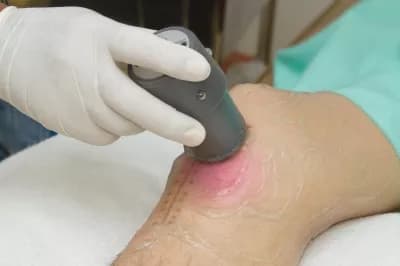What are the other Names for this Condition? (Also known as/Synonyms)
- Anterior Knee Pain in Adolescent
What is Adolescent Anterior Knee Pain? (Definition/Background Information)
- Adolescent Anterior Knee Pain is a condition that occurs when an adolescent experiences pain within the front or center of the knee, usually below the kneecap (or patella)
- This condition is not usually caused by any physical abnormalities within the knee, but by overuse, in children who are physically active and participate in sports
- The treatment for children with Adolescent Anterior Knee Pain includes rest, non-steroidal anti-inflammatory medications, and strengthening exercises. The prognosis of Anterior Knee Pain in Adolescent is generally excellent with proper treatment
Who gets Adolescent Anterior Knee Pain? (Age and Sex Distribution)
- Adolescent Anterior Knee Pain is an overuse injury that occurs in children who are physically active and participate in sports
- Females are affected more commonly by this condition than males
- Children of all races and ethnic backgrounds are prone to Adolescent Anterior Knee Pain
What are the Risk Factors for Adolescent Anterior Knee Pain? (Predisposing Factors)
Common risk factors associated with Adolescent Anterior Knee Pain include:
- Children who repeatedly overuse their knees while participating in sports such as basketball, tennis, and track and field events (running and jumping)
- Girls are twice as likely to develop this condition than boys
- Abnormal pressure on the knee, due to excessive body weight, such as obesity
It is important to note that having a risk factor does not mean that one will get the condition. A risk factor increases ones chances of getting a condition compared to an individual without the risk factors. Some risk factors are more important than others.
Also, not having a risk factor does not mean that an individual will not get the condition. It is always important to discuss the effect of risk factors with your healthcare provider.
What are the Causes of Adolescent Anterior Knee Pain? (Etiology)
Common causes of Adolescent Anterior Knee Pain include:
- Physically activity in children is the most common contributing factor of Adolescent Anterior Knee Pain
- Children with poor flexibility in their quadriceps and hamstring muscles
- Muscle imbalance of the quadriceps and hamstrings
- Improper alignment of the legs
- Poor techniques when training for a sport or using the sports equipment
- A sudden change of shoes or playing surface
What are the Signs and Symptoms of Adolescent Anterior Knee Pain?
Signs and symptoms of Adolescent Anterior Knee Pain include:
- Pain behind and below the kneecap: A sudden change in intensity or activity level may cause pain in the kneecap
- Pain may also occur when kneeling, squatting, and bending the knee
- A popping or cracking sound in the knee when climbing stairs or standing after an extended period of sitting
How is Adolescent Anterior Knee Pain Diagnosed?
Physicians may use the following tools to diagnose Adolescent Anterior Knee Pain:
- Physical examination: Adolescent Anterior Knee Pain can usually be diagnosed by a thorough physical examination. During the examination, a physician will examine a child as they walk, jump, squat, sit, and lie down. In addition to this, a complete medical history may aid in arriving at a definitive diagnosis
- X-ray of the knee: An x-ray of the knee is a common method used to diagnose Adolescent Anterior Knee Pain. This diagnostic test provides a clear image of the knee, may help confirm the diagnosis, and determine the extent of the injury
- Magnetic resonance imaging (MRI) of the knee: An MRI is a more detailed scan that uses a magnetic field to produce images. This allows physicians to view any damage to the bones and soft tissue, to confirm the diagnosis
Many clinical conditions may have similar signs and symptoms. Your healthcare provider may perform additional tests to rule out other clinical conditions to arrive at a definitive diagnosis.
What are the possible Complications of Adolescent Anterior Knee Pain?
Adolescent Anterior Knee Pain may make it difficult for an adolescent child to perform daily activities, such as walking up and down the stairs.
How is Adolescent Anterior Knee Pain Treated?
Nonsurgical methods are predominately used to treat Adolescent Anterior Knee Pain and these include:
- Any activity that aggravates the knee condition should be avoided. The physician usually advises individuals to refrain from such activities until the symptoms get better
- Applying ice to the knee may help decrease pain and reduce swelling
- Non-steroidal anti-inflammatory medication, such as ibuprofen and naproxen, can help in decreasing the pain in the knee
- Shoe orthotics may also be prescribed to help relieve pain
- After the pain has decreased, physical therapy exercises may help children regain some lost range of motion in the knee
How can Adolescent Anterior Knee Pain be Prevented?
A few recommendations to help prevent Anterior Knee Pain in Adolescents include:
- Warming-up prior to exercising
- Correct stretching techniques are recommended before and after an athletic event
- Maintaining a healthy body weight can help prevent abnormal pressure on the knee joint
- Wearing appropriate footwear (such as the proper shoe size)
What is the Prognosis of Adolescent Anterior Knee Pain? (Outcomes/Resolutions)
- Adolescent Anterior Knee Pain may be successfully treated without surgery
- The long-term prognosis is usually good after treatment
- When properly treated, a high percentage of adolescents regain their full strength and range of motion in the knee
Additional and Relevant Useful Information for Adolescent Anterior Knee Pain:
The following DoveMed website link is a useful resource for additional information:
Related Articles
Test Your Knowledge
Asked by users
Related Centers
Related Specialties
Related Physicians
Related Procedures
Related Resources
Join DoveHubs
and connect with fellow professionals


0 Comments
Please log in to post a comment.